Xishuangbanna Mengwan Great Buddhist Temple
Xishuangbanna Mengwan Great Buddhist Temple
Situated in the suburbs of Jinghong City, the prefecture of Xishuangbanna Dai Autonomous Prefecture, Yunnan Province, the Monastery is built according to the national AAAA standard. The Monastery was restored and rebuilt on the site of Jingpiao Buddha Temple, an ancient royal monastery of the Dai Dynasty. Jingpiao Buddha Temple was built by a Dai king named Pulong in memory of Nansha Weibian, the princess of the Dai Dynasty who died of illness. The Princess believed in Buddhism all her life, so every festival the Dai Prince visited the monastery and held a large-scale law meeting to commemorate the princess and promote Buddhism at the same time. According to historical records, "Jingpiao Buddhist Temple" was built in the Ming Dynasty. It is one of the symbolic buildings of Southern Buddhism and an important place for Buddhist activities in Banna. The building was destroyed in the war of 2883 Buddhist calendar (1848 AD, during the reign of Xianfeng in the Qing Dynasty), 169 years ago. The Buddhist temple was rebuilt in 2005. On March 9, the same year, a large-scale land opening ceremony was held. On May 9, 2005, a grand opening ceremony was held to lay the foundation of the hall. During the construction of the hall, a large number of silver coins, silver boxes and Buddhist legal supplies were excavated. When the first phase of the Buddhist Temple project was completed on November 3, 2007, 108 eminent monks at home and abroad were invited to hold a grand ceremony for the opening of Buddhist temples. There were 650,000 Buddhist followers from all nationalities both inside and outside the state participating in the ceremony. Covering an area of 400 mu, the Buddhist temple is built in accordance with the mountains, with a drop of 122.8 meters. It is sitting in the shape of a Buddha, which is unique at home and abroad. With the life of Buddha Sakyamuni and Buddhist temple activities as the main line, the scenic spot integrates ingeniously into the landscape and architectural groups, fully demonstrating the historical and traditional cultural colors of Southern Buddhism. From the front square of Wanfo Pagoda overlooking Jinghong City, you can see the beautiful tropical scenery.
Introduction to Scenic Spots
Xishuangbanna Mengfan Grand Buddhist Temple is located at the end of Highway 1 in Jinghong City Resort, Xishuangbanna, to Nanlian Mountain. It covers an area of 650 Mu and has a construction area of 24,000 square meters, with a total investment of about 200 million yuan. According to the national AAAA level scenic spot standard. The scenic spot is centered on the promotion of "Buddhist culture in the south" and the inheritance of traditional culture by modern means, so as to meet the needs of modern tourists for the ornamental experience of history, Buddhist culture and regional culture.
festival activities
edit
The Monastery was restored and rebuilt on the site of Jingpiao Buddha Temple, an ancient royal monastery of the Dai Dynasty. Jingpiao Buddha Temple was built by a Dai king named Pulong in memory of Nansha Weibian, the princess of the Dai Dynasty who died of illness. The Princess believed in Buddhism all her life, so every festival the Dai Prince visited the monastery and held a large-scale law meeting to commemorate the princess and promote Buddhism at the same time. According to historical records, "Jingpiao Buddhist Temple" was built in the Ming Dynasty. It is one of the symbolic buildings of Southern Buddhism and an important place for Buddhist activities in Banna.
Practical information
Admission ticket
The price of fragrant flower ticket is 120 yuan per ticket, the online booking price is 108 yuan per ticket (excluding the tourist car in the scenic area), the one-way trip of the tourist car is 40 yuan per person, and the round trip is 60 yuan per person; the children under 1.2 meters and 1.4 meters in height are full-time college, middle school and elementary school students with student certificates, and the fragrant flower ticket (80 yuan/ticket) can be courteously offered (except for large-scale legal activities); the height of the fragrant flower ticket is less than 1.2 meters. Children with identity cards, persons over 70 years of age, persons with national disabilities, servicemen, officers and soldiers, and tourist guides and managers in Xishuangbanna are allowed to enter the temple free of charge (except for large-scale legal activities).
Opening Hours
The opening time of scenic spots is 8:00-17:30; the opening time of water splashing activities of "Bathing Buddha" is 14:00 and 16:00, respectively. Peacock flying activities are 5 times a day, 9:30, 11:00, 13:30, 15:00 and 17:00.
Traffic Information
Self-driving
Jinghong City-Galan Middle Road-Xuanxiu Avenue-Daxing Times Square-Mengwan Avenue-Terminus
Take a taxi
The Mongfan Buddhist Temple is 4 kilometers away from Jinghong City. It costs 15 yuan from downtown to Mongfan Buddhist Temple by taxi.
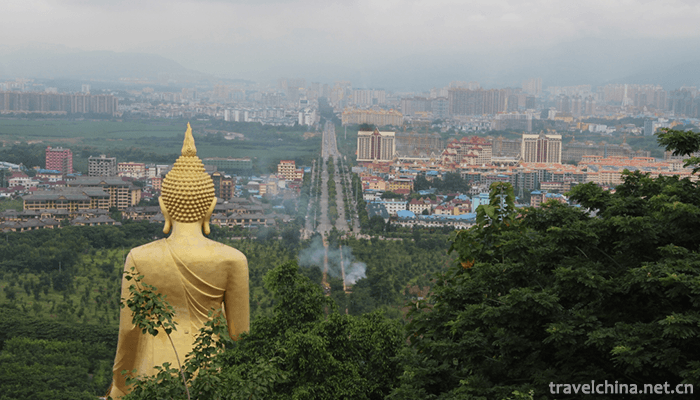
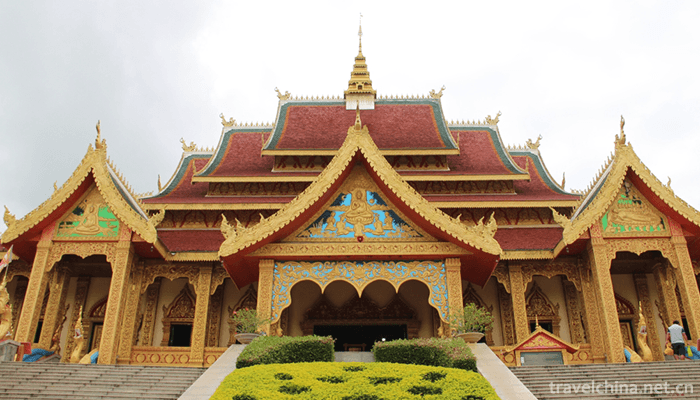
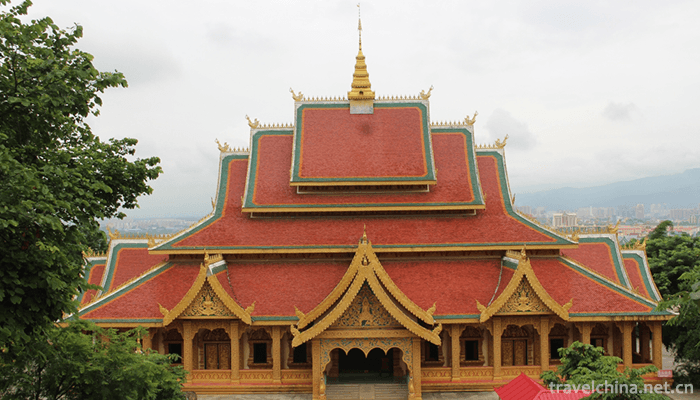
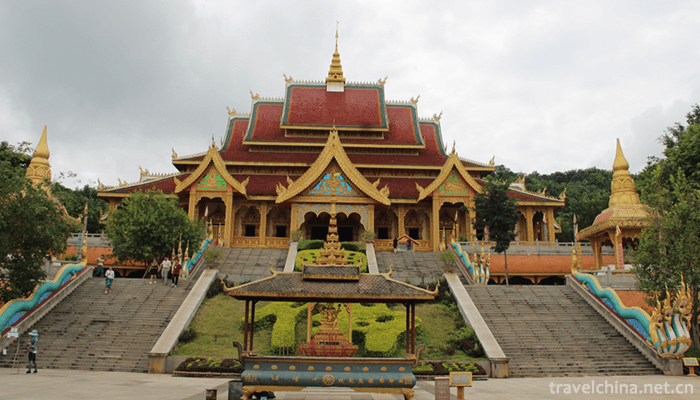
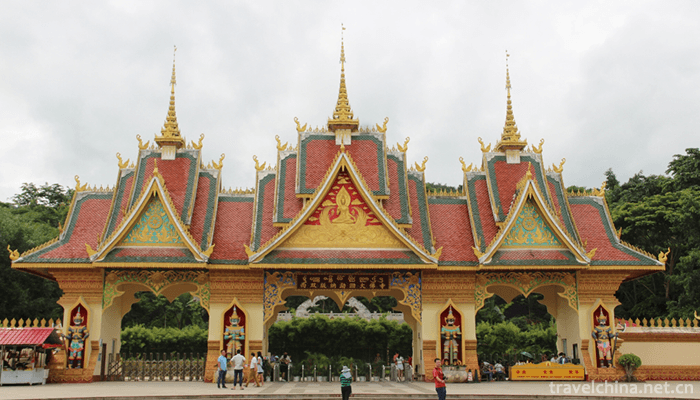
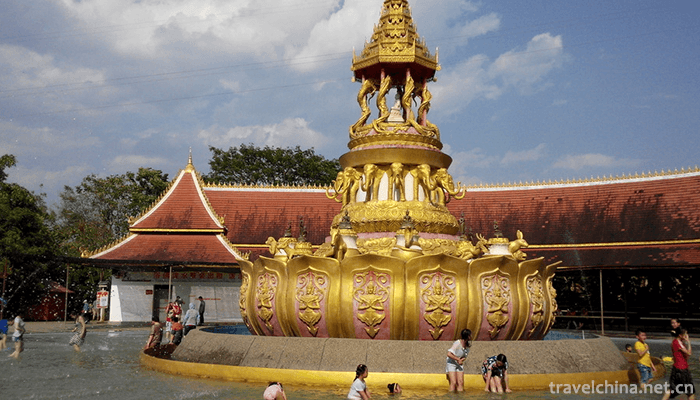
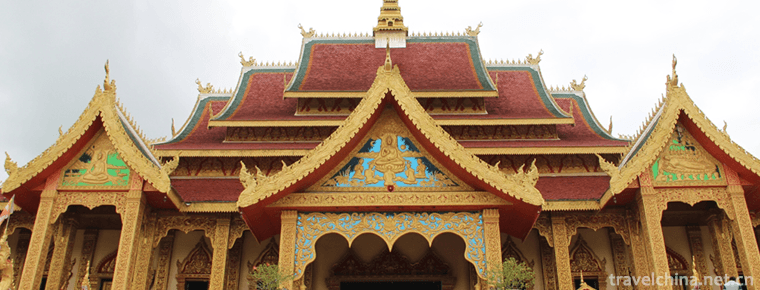
-
1.Dongchuan Red Land Scenic Area
"Dongchuan Red Earth" is located in the north-east direction of Kunming
Time 2018-10-21 -
2.Changchun World Sculpture Park
Changchun World Sculpture Park is located in the south of Renmin Street in Changchun City. It covers 92 hectares, including 11.8 hectares of water.
Time 2018-12-05 -
3.Lingyan Temple in Jinan
Lingyan Temple, built in the Eastern Jin Dynasty, has a history of more than 1600 years. Located in the north foot of Mount Tai in the southwest of Jinan City, Shandong Province
Time 2019-02-03 -
4.Luo Bu Lin Ka Roblinka
Roblinka is a national key cultural relic protection unit, located in the western suburbs of Lhasa, Tibet. Founded in the 1840s (Dalai VII), the Dalai Lama's summer administration place is a typical T
Time 2019-02-06 -
5.Maoling Museum
Maoling Museum is located on the Wuling Platform between Xianyang and Xingping in Shaanxi Province, about 40 kilometers away from Xi'an. It is a Museum of Dynastic History of the Western Han Dynasty
Time 2019-02-07 -
6.Water Curtain Gorge Scenic Area
Shuixian Gorge Scenic Area is located in the southern mountain area of Jinan, Liubu, the first town of ecotourism in Shandong Province. Covering an area of more than 6000 mu, Jinan's No. 1 Peak Ladder
Time 2019-02-13 -
7.Bo Ba Shen en
Bobassengen is a unique folk large-scale narrative mass pot village dance created by Ganbao Tibetan Village in Jiarong Tibetan area, Lixian County, Sichuan Province. "Boba"
Time 2019-04-04 -
8.dough figurine
Noodles, also known as face sculptures, models and flowers, are simple but highly artistic Chinese folk crafts. As early as the Han Dynasty, Chinese face sculpture art has been written down. It uses f
Time 2019-06-05 -
9.Qinghai Lower String
Qinghai Xixian, which originated in the late Qing Dynasty, is one of the traditional folk arts native to Qinghai. It is a sitting and singing art, singing alone or in pairs.
Time 2019-06-11 -
10.Xiping Folk Song
Xiping Folk Song is a traditional folk song in Xiping Town, Xixia County, Nanyang City. Xiping Town, located in the hinterland of Funiu Mountain in Western Henan Province, is located in the combinatio
Time 2019-07-01 -
11.Baoguang Temple
Baoguang temple is located in Xindu District, Chengdu City, Sichuan Province, China. It is one of the Buddhist temples with a long history, large scale, complete structure and quiet environment.
Time 2020-11-05 -
12.Science and technology of Panzhihua
In 2018, there were 2865 patent applications in Panzhihua. The output value of high-tech industry reached 53.1 billion yuan, and 2015 science and technology projects were arranged, including 780 high-tech projects, 320 new high-tech projects in that year, and 16 science and technology
Time 2020-12-14